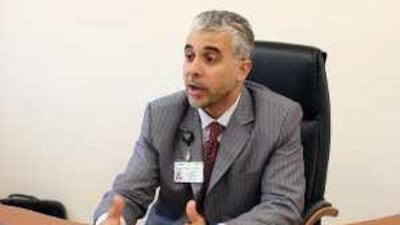ABU DHABI // Sheikh Khalifa Medical City, the emirate's largest public hospital and clinic network, says it can now access the medical records of nearly half a million patients at the touch of a button. Giving an update on a process it started in 2007, the network said it had created electronic medical records for 485,000 patients - which amounts to almost a third of the emirate's population - marking a major step towards electronically linking up public hospitals in the emirate.
It also said it hoped to phase out paper records by the end of the year. If it succeeds, it would represent a major achievement for the network - which runs the capital's busiest emergency wards - since medical institutions in Europe and the United States have struggled to implement such systems. Electronic medical records allow doctors to access critical patient information, including their medical history, blood type and use of prescription drugs, almost instantaneously, regardless of which hospital or clinic keeps their details.
The hope is that this will reduce medical errors and the prescribing of unnecessary drugs, and speed up diagnoses and treatment. Sulaiman Hadi Sulaiman, Sheikh Khalifa Medical City's chief of information, said SKMC, which is operated by Seha, the Abu Dhabi health services company that manages public hospitals and clinics, was preparing to link its system with all the emirate's public hospitals. "By creating electronic medical reports we are allowing clinicians, physicians and nursing staff to share and collaborate on a patient's treatment," he said.
"The overall aim is to improve patient care in every aspect." He added that SKMC would only allow other facilities to access patients' information with their permission. Other countries have struggled to implement electronic systems, mainly due to debates surrounding patient privacy. The National Health Service in Britain began introducing electronic records in 2007 but has not managed to fulfil its aim of connecting all the NHS services across England and has faced stringent opposition from human rights groups, which accuse it of violating privacy laws.
Dr Assem al Alawani, a consultant in family medicine and lead physician at Al Bateen Family Medicine Clinic, an SKMC clinic in the capital, said electronic medical records would be a tremendous help. It was not uncommon, he said, for patients to visit a number of different doctors with the same complaint. "They will come into the clinic and tell their complaint as if it was new, forgetting that they had previously taken medication," he said.
"With this system you can see the previous visits, previous medications and any allergies. "This helps avoid any medication errors by prescribing the same medicines again or ones which are not suitable." Electronic medical records can also alert doctors if they are prescribing medications that may cause an adverse reaction if taken together. "It may be that the doctor will override it as it is on a case-by-case basis," Dr al Alawani said. "But it is another check to ensure patient safety."
Prescriptions can also be filed electronically and instruction labels printed out rather than written by hand or simply given verbally. The system will further allow electronic claims to be submitted to insurance companies as the data is already electronic. X-ray and laboratory test results can also be requested electronically. munderwood@thenational.ae

